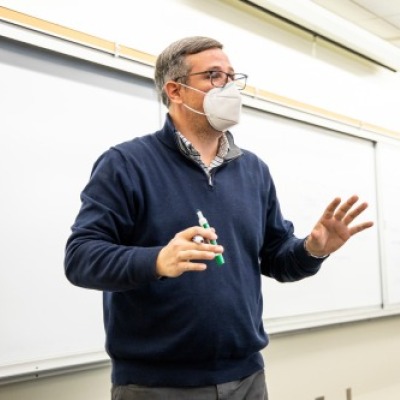Take a Deeper Dive
At its core, Introduction to Science, Medicine, and Technology Studies (SMS 150) embraces an interdisciplinary approach that is a hallmark of Grinnell’s liberal arts ethos - an approach to education that invites you to think critically about, and to wrestle with, big questions about the nature, evolution, and impact of science, medicine, and technology.
“The goal of this course is for students to come away with a richer, more complex understanding of how the fields of science, medicine, and technology work,” says Michael Guenther, associate professor and department chair of history and concentration chair of science, medicine, and society. “This means you’ll take a deeper dive into how people actually create knowledge or technologies, which can be strikingly different than the popular or ‘textbook’ portrayal of how scientists, clinicians, engineers, etc. do their work.”
You’ll do more than just take an academic look into the “what” and “how” of the subject matter, you’ll also take part in innovative, hands-on experiences, often taught by guest instructors. Past sessions have included units on stone-tools, musical technology, and the rise of printing with sessions using rare books in the library and printing techniques in Bucksbaum. More recently, students dove into the practice of drawing in STEM with sessions taught by artist Tara Shukla, who has at times borrowed specimens from the College’s biology department to sketch and draw for her own work.
“The course is very interdisciplinary,” says Guenther. “It is meant to introduce you to how a variety of scholars study the fields of science medicine and technology. We demonstrate how anthropologists use ethnography to capture the way scientists or engineers or physicians conduct their craft, for example. By the same token, you’ll start to learn how a sociologist, historian, or philosopher brings different questions and perspectives to bear on explaining how these STEM fields work. The goal is for you to explore your interests and then hopefully go on to study more advanced work in these disciplines.”
For students who choose to pursue additional studies in this area, the Science, Medicine, and Society (SMS) concentration maps out a variety of 200- and 300-level coursework that explores these facets of science, medicine, or technology, as well as many that consider other areas of the field as well. If your professional goals include working in the sciences, health professions, or in various forms of engineering technology and design, this discourse can be very informative intellectually and formative to your goals.
“While this course provides you with a better understanding of how the fields of science, medicine, and technology work together, it is also designed to help you think about how these fields interact with society at large,” says Guenther. “You’ll be encouraged to wrestle with larger, structural questions about how STEM research is funded and what gets prioritized, how much society should defer to experts in these areas, how new forms of knowledge and technology transform society, and whether or not this is story is always one of linear progress.
“This is a newer field,” he adds. “But it is already becoming increasingly global, focusing on the evolution of science, medicine, and technology along different complex lines in different cultures and parts of the world. It used to be a story entirely about the rise and evolution of STEM fields in western Europe, and now it is increasingly comparative and international in focus.”
Find out more about the Science, Medicine, and Society Concentration

Why Study Science, Medicine, and Society?
The modern world has been profoundly shaped by science, medicine, and technology, so it’s crucial for you to understand how these fields function and interact.

Concentrate on Your Interests, Not Just a Career
Though interested in a career in medicine, Nicole Cabe ’23 is among a growing number of students with this shared interest who have chosen to major in something other than biology, chemistry, or one of the other traditional pre-med majors.


